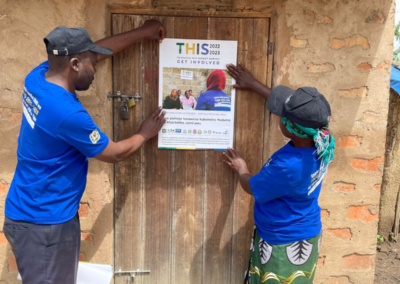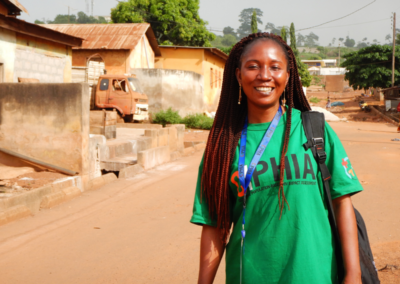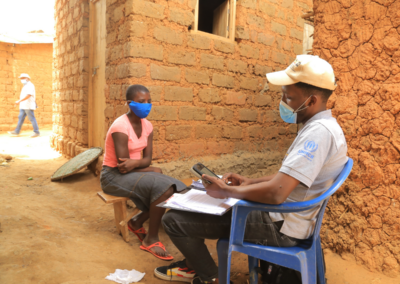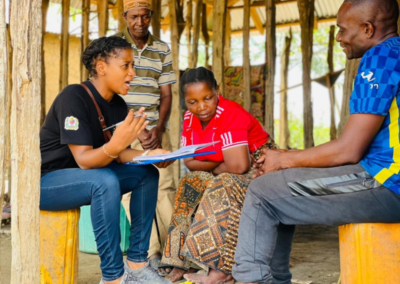The Tanzania HIV Impact Survey (THIS 2022-2023) reached a major milestone last month when the survey teams completed household data collection. This critical and complex fieldwork phase of the survey was completed at remarkable speed, with nearly 36,000 people interviewed and 33,630 HIV tests conducted in just 127 days.
“It’s incredible to see the vast area that was covered and the number of participants that were recruited in such a short amount of time,” said Erika Fazito, ICAP technical specialist for the multi-country Population-Based HIV Impact Assessment (PHIA) project, of which THIS 2022-2023 is a part.
The second PHIA survey in Tanzania to measure HIV incidence, HIV prevalence, and viral load of communities across the country, THIS 2022-2023 is made possible by financial support from the U.S. President’s Emergency Plan for AIDS Relief (PEPFAR) and technical assistance through the U.S. Centers for Disease Control and Prevention (CDC) and ICAP at Columbia University. The survey is led by the Government of Tanzania (GoT) through the Tanzania Commission for AIDS (TACAIDS), Zanzibar AIDS Commission (ZAC), the Ministries of Health (MoH) of mainland and Zanzibar, National Bureau of Statistics (NBS), the Office of Chief Government Statistician (OCGS), and the President’s Office Regional Administration and Local Government (PORALG). The survey is being implemented by NBS, OCGS, and ICAP in collaboration with local partners, including the National Institute of Medical Research (NIMR), the Zanzibar Institute of Health Research (ZAHRI), public health laboratories, the National AIDS Control Program (NACP), and the Zanzibar Integrated HIV, Hepatitis, Tuberculosis and Leprosy Program (ZIHHTLP).
Data collection for THIS 2022-2023, which began in November 2022 in both Tanzania Mainland and Zanzibar, was completed in just four months. Sixty-five teams involving 538 survey staff visited 31 regions and 566 enumeration areas. Intensive training was conducted in September and October 2022 for all field teams. Data collection teams were trained on laboratory procedures, quality control protocols, data collection procedures, and ethics to ensure compliance with the survey quality standards and procedures.
“We have to thank the community mobilization work that occurred before and during the survey, which helped us achieve high participation, and the data collection teams and survey management teams who enabled effective collection of data to improve our understanding of the status of the HIV epidemic in Tanzania,” said Fazito.
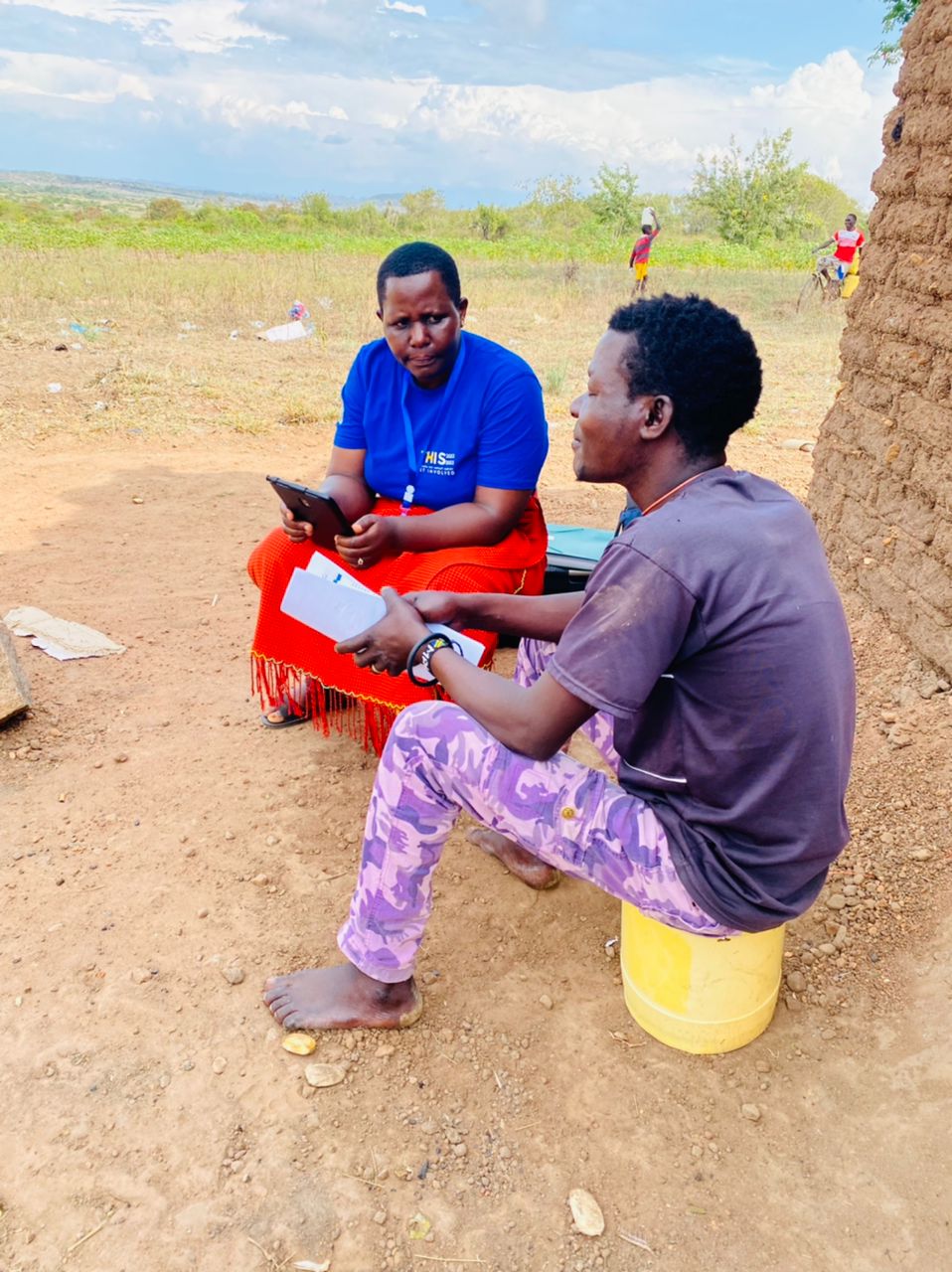
THIS 2022-2023 interview
Across the selected enumeration areas, the community mobilization officers used a variety of approaches in engaging communities and encouraging participation in the survey, including door-to-door mobilization. A total of 1,130 community mobilizers, deployed at the local community level, introduced the survey to community leaders, religious leaders, cultural leaders, and other influential people in communities. Mobilization efforts were especially important in engaging certain groups, such as men, whose participation in HIV testing has been historically low in the past. Ultimately, teams recruited 17,300 consenting households.

THIS 2022-2023 HIV testing
Results from THIS 2022-2023 will help to inform key stakeholders about Tanzania’s progress in reaching the UNAIDS 95-95-95 targets. The survey findings, which will be released to the public in the coming months, will include data on the percentage of people living with HIV, the number of new HIV infections occurring each year, and the percentage of HIV+ people with viral load suppression, while assessing differentiation by age, sex, and geographic area. All participants of the survey who were tested received counseling, and those who tested positive for HIV who were not already on antiretroviral treatment (ART) were referred to a health facility of their choice to initiate treatment and were offered active linkage to care. Survey participants were also tested for hepatitis B and hepatitis C.
THIS 2022-2023 results will be especially critical in understanding the progress made and the barriers that persist since the first PHIA conducted in Tanzania, THIS 2016-2017. That survey, for example, demonstrated that an estimated 60.6 percent of adults 15 years and older were aware of their HIV+ status, which was significantly below the 90 percent UNAIDS target at that time.
“As we move into the data analysis phase, we thank our partners – NBS, OCGS, CDC, various health facilities, and many more,” said Haruka Maruyama, MPH, country director of ICAP in Tanzania. “These survey findings will inform future efforts to address the HIV epidemic, illuminating where the widest gaps remain.”
“Updated results from THIS 2022-2023 are urgently needed,” said Dr. Damian Damian, team lead for Epidemiology and Surveillance at CDC Tanzania, “to inform more targeted HIV programming, policy, and funding allocation to attain the UNAIDS 95-95-95 targets and ultimately end the HIV epidemic in Tanzania and worldwide by 2030.”
About ICAP
A major global health organization that has been improving public health in countries around the world for nearly two decades, ICAP works to transform the health of populations through innovation, science, and global collaboration. Based at Columbia Mailman School of Public Health, ICAP has projects in nearly 40 countries, working side-by-side with ministries of health and local governmental, non-governmental, academic, and community partners to confront some of the world’s greatest health challenges. Through evidence-informed programs, meaningful research, tailored technical assistance, effective training and education programs, and rigorous surveillance to measure and evaluate the impact of public health interventions, ICAP aims to realize a global vision of healthy people, empowered communities, and thriving societies.







